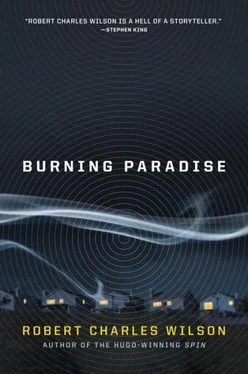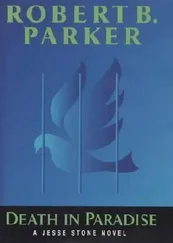Robert Charles Wilson
BURNING PARADISE
It is natural for the mind to believe and for the will to love; so that, for want of true objects, they must attach themselves to false.
—Blaise Pascal
PART ONE
UNSPEAKABLE TRUTH
Nature is mindless, but it has mastered the art of deception.
—Ethan Iverson,
The Fisherman and the Spider

BUFFALO, NEW YORK
EVERYTHING THAT FOLLOWED MIGHT HAVE happened differently—or might not have happened at all—had Cassie been able to sleep that night.
She had tried to sleep, had wanted to sleep, had dutifully gone to bed at 11:30, but now it was three hours and some minutes past midnight and her thoughts were running like hamsters in an exercise wheel. She stood up, switched on the light, dressed herself in gray sweat pants and a yellow flannel shirt, and padded barefoot down the chilly parquet floor of the hallway to the kitchen.
Unusually, she was alone in the apartment. Except for Thomas, of course. Thomas was her little brother, twelve years old and soundly asleep in the second bedroom, a negligible presence. Cassie and Thomas lived with their aunt Nerissa, and Cassie still thought of this as Aunt Ris’s apartment although it had been her home for almost seven years now. Usually her aunt would have been asleep on the fold-out sofa in the living room, but to night Aunt Ris was on a date, which meant she might not be back until Saturday afternoon.
Cassie had welcomed the chance to spend some time alone. She was eigh teen years old, had graduated from high school last spring, worked days at Lassiter’s Department Store three blocks away, and was legally and functionally an adult, but her aunt’s protectiveness remained a force to be reckoned with. Aunt Ris had made a completely unnecessary fuss about going out: You’ll be all right? Yes. Are you sure? Of course. You’ ll keep a close eye on Thomas? Yes! Go! Have a good time! Don’t worry about us!
The evening had passed quickly and pleasantly. There was no television in the apartment, but she had played rec ords after dinner. Bach’s Well-Tempered Clavier had the useful effect of making Thomas drowsy even as it rang in Cassie’s head like the tolling of a divine bell, echoing even after Thomas was in bed and the house was eerily quiet. Then she had turned off most of the lights except for the lamp on the living-room end table and had huddled on the sofa with a bowl of popcorn and a book until she was tired enough to turn in.
So why was she prowling around now like a nervous cat? Cassie opened the refrigerator door. Nothing inside seemed appetizing. The linoleum floor was cold under her feet. She should have put on slippers.
She scooted a kitchen chair next to the window and sat down, resting her elbows on the dusty sill. The corpses of six summer flies lay interred behind the sash-tied cotton blind. “Disgusting,” Cassie said quietly. November had been windy and cold, and wisps of late-autumn air slipped through the single-pane window like probing fingers.
The window overlooked Liberty Street. Aunt Ris’s apartment occupied the floor above a store that sold and repaired secondhand furniture, in a two-story brick building like every other building on the block. The next-door neighbors were a Chinese restaurant on the north side and a grubby antique shop on the south. From where she sat Cassie could see the wide glass display windows of the Groceteria and a half dozen other businesses on the north side of Liberty, all the way to Pippin Street and Antioch Avenue. Not much traffic this time of night, but the after-hours clubs in the entertainment district were just closing. On other sleepless Fridays—Cassie was a restless sleeper at the best of times—she had watched cars rolling through red lights in drunken oblivion, had heard drivers gunning their engines in mad displays of masculine enthusiasm. But just now the street was silent and empty. Of pedestrians there were none.
Or, she corrected herself, no. There was one pedestrian: a man standing alone in the mouth of the narrow alley that separated the Groceteria from Tuck’s Used Books.
Cassie hadn’t seen him at first because of the Armistice Day banners strapped to the high standards of the streetlights. The city had put up the banners a couple of days ago. There was a parade every year to mark the 1914 Armistice, but this year the city (the state, the nation, the world in general) was making a big deal out of the centenary: one hundred years of peace. Relative peace. Approximate peace.
Cassie had always loved Armistice Day. Next to Christmas, it was her favorite holiday. She still remembered her parents taking her to watch the parade back in Boston—remembered the sidewalk vendors who sold roasted chestnuts in twists of paper, the Floats of the Nations populated by schoolchildren in implausibly colorful ethnic dress, the battling cacophonies of high-school marching bands. The violent death of her mother and father had taught Cassie things about the world that would never be acknowledged in any Armistice Day parade, but she still felt the bittersweet tug of those times.
The Centennial banner flapped in a brisk wind, alternately revealing and concealing the man in the shadows. Now that Cassie had seen him she couldn’t look away. He was a drab man, an ordinary man, probably a businessman, dressed for the season in a gray coat down to his knees and with a fedora on his head, but what unsettled Cassie was the impression that he had been looking up at her —that he had turned his head away the moment she had seen him.
Well, but why not? At this hour, hers might be the only lighted window on the block. Why shouldn’t it catch his eye? It was only deeplyingrained habit that made her suspicious. Aunt Ris and the other local survivors of the Correspondence Society had trained Cassie in their secret protocols, of which the first rule was the simplest: Beware the attention of strangers.
The solitary stranger was no longer looking at her window, but his attention still seemed fixed on the building where she lived. His gaze was flat and unwavering and on closer inspection subtly lunatic. Cassie felt a knot tighten in her stomach. This would happen on a night when Aunt Ris was out. Not that anything had really happened, but it would have been nice to have a second opinion to call on. Should she really be worried about a lone man standing in the windy street after midnight? It was a calculation difficult to make when she was too conscious of the empty rooms around her and the shadows they contained.
These thoughts were so absorbing that she was startled when the wind lifted the Armistice Day banner once more and she saw that the man had moved. He had taken a few steps out of the alley and across the sidewalk; he was standing at the edge of Liberty Street now, the toes of his brown shoes poised where the curb met the gutter. His face was upturned once again, and although Cassie couldn’t see his eyes she imagined she felt the pressure of their attention as he scanned the building. She ducked away from the window, crossed the kitchen floor and switched off the overhead light. Now she could watch him from the shadows.
During the time it took her to return to her chair by the window he had moved only slightly, one foot on the sidewalk, one foot in the street. What next? Was he armed? Would he cross the street, come inside the building, knock on the door of the apartment, try to break it down if she refused to let him in? If so, Cassie knew what to do: grab Thomas and leave by the fire escape. Once she was sure she wasn’t being followed she would hurry to the home of the nearest Society member… even though the nearest Society member was the disagreeable Leo Beck, who lived in a cheap apartment five blocks closer to the lake.
Читать дальше

 BUFFALO, NEW YORK
BUFFALO, NEW YORK








